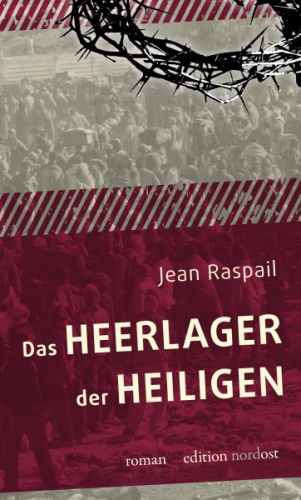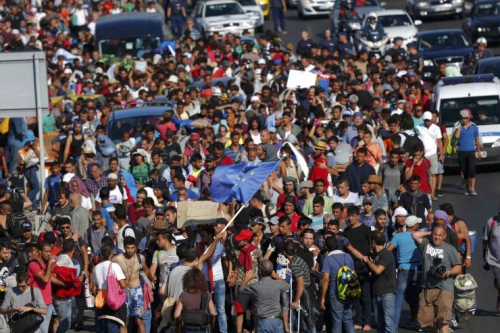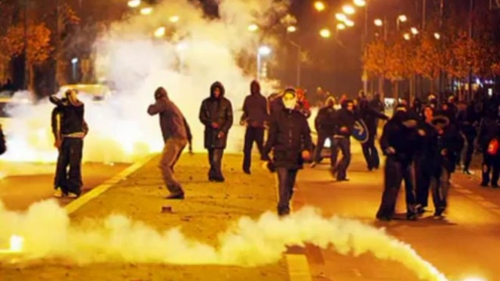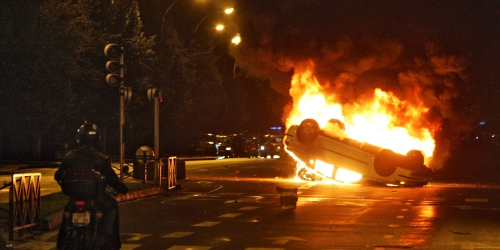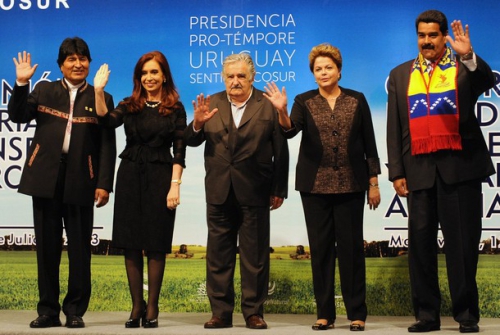
Déluge biblique et affectivisme postmoderne
Ex: http://www.dedefensa.org
7 septembre 2015 – ... Pour commencer, battez tambours, sonnez trompettes, et Gloire et Honneur à Michel Onfray, le 3 septembre 2015, sur BFM-TV... Pour la séquence, d’abord une image en studio d’une autre émission, avec BHL en image fixe, BHL seul, léonin par rapport au vulgaire et si loin du vulgaire, le regard au lointain qui voit le sort du monde, Statue du Commandeur d’une élégance inévitable ; la voix “off”, du pur-BHL dans le genre tragiquement-calme, mais humanitaire-hein, discourant à propos de la photo du petit garçon syrien trouvé mort sur une plage de Turquie ; des propos comme sur une tartine à la gelée royale, chargée de lieux communs délicieux, à propos de ces “images” qui “secouent le monde”, ou bien qui ont “l’étrange vertu” de “réveiller la conscience universelle”, “la mort d’un enfant”, “atroce” (on cite à vue de nez et d’une oreille un peu bouchée)... Puis, question à Onfray de l’aimable présentatrice : «Pour une fois, vous êtes d’accord ?» ; réponse, toute fureur rentrée, ce qui laisse à Onfray la disposition d’un langage clair et tranchant :
— Non non, il a pas honte, il a pas honte, il ferait mieux de rester caché. Vous savez, je pourrais citer Audiard, “les cons ça ose tout, c’est même à ça qu’on les reconnaît”, parce que franchement, avec tout ce qu’il advient aujourd’hui il ferait mieux de rester chez lui ... Voilà un monsieur ...
— Il n’y a vraiment rien qui peut vous mettre d’accord ...
— Mais enfin, si, peut-être, sûrement, des choses, mais pas ça... Voilà quelqu’un qui a invité à bombarder la Libye, qui a invité à tuer des Libyens, sous prétexte qu’en tuant des Libyens on rendrait possible la démocratie ... On a détruit un État qui valait ce qu’il valait, mais avec lequel on pouvait discuter, on pouvait discuter avec l’interlocuteur qu’était Kadhafi. Là, on ne peut plus rien à faire avec la Libye, c’est une base extraordinaire pour le terrorisme... Responsable de rien, Bernard-Henri Lévy, il vient de nous expliquer qu’il faudrait ceci, qu’il faudrait cela... D’ailleurs on voit des photos de lui, récemment, où il donne des conseils aux gens qui combattent, etc. ... Donc, il faut juste qu’il y ait un moment donné où il faut un peu de pudeur, tous ces gens qui ont rendu possible cet enfant mort, et Bernard-Henri Lévy en fait partie ...
— Il est complice ?
— Oui, évidemment, il est complice, comme d’autres sont complices, les présidents de la République d’hier et d’aujourd’hui, qui défendent exactement la même ligne, et qui disent “oh là là, c’est effrayant cette photo”... C’est effrayant mais ce sont des criminels ces gens-là, leur politique est criminelle, on devrait commencer par arrêter cette politique ... Un chef d’État qui voudrait être un chef d’État dignement, devrait commencer par changer de politique, faire une politique indépendante ... (*)
Le démon, élégamment habillé d’une chemise d’un blanc éclatant comme l’innocence, ouverte sur un torse bronzé comme la peau tannée d’un vieux loup de terre qui a affronté les plus grands dangers pour sauver les pauvres hères accablés par les tyrans, surmonté d’une chevelure grisonnante du plus heureux effet puisque coiffée par les soins prodigieux des grands vents du Sud de la migration, le démon s’avance, à peine masqué. D’aucuns le nomment BHL, ce qui est à la fois à mourir de rire et mourir de plaisir.
Il ne cesse d’éructer, de tonner, de s’emporter. En un sens, il nous avait tous avertis. La Libye, la Syrie, tout cela était assuré. L’innommable Kadhafi jouait déjà de la migration du temps où on le subventionnait grassement, puis vint la “libération de la Libye” dont il (BHL) fut le modeste inspirateur, qui n’a rien provoqué en fait de migration puisque les migrants qui traversent la Méditerranée ne sont pas des Libyens même s’ils viennent de Libye. Les Libyens eux-mêmes, ils sont chez et ils y restent, chez eux, débarrassés du tyran et c’est bien, et ils vont bien conformément aux consignes. Le reste, les politiques n’avaient pas prévu. La Syrie, c’est encore pire ! Tout est de la faute d’Assad, qui n’a pas disparu au printemps 2011 comme il aurait du, et qui est le véritable créateur de Daesh, contrairement à ce qu’affirment les bouffons de la DIA. D’où la fuite précipitée actuelle des Syriens, bien entendu à cause d’Assad, vers l’Europe dont le devoir humanitariste est de tous les accueillir... Ah, si Obama n’avait pas «trahi», à l’été 2013, lorsqu’on pouvait encore bombarder Assad, Damas et quelques trucs alentour, avec quel profit pour l’humanité ! Tout serait bien rangé aujourd’hui, dans la Syrie démocratique, comme ce l’est dans la Libye démocratique.
On traduit, on résume, on adapte, on approximative. Avec lui, seul compte l’esprit, la citation précise est inutile, presque obscène dirait-on tant elle suppose un doute quant à la justesse de la pensée. BHL est désincarné, l’être humain ne compte plus, qui s’est sacrifié derrière la dimension globalisante qu’il a acquise ; à l’égal, —mais un cran au-dessus, tout de même, – des alchimistes qui transmutaient le vil plomb en or, BHL transmute le lieu commun en parole de Prophète... Il est l’ange-démiurge exceptionnel de cet ouragan de communication qui a saisi l’Europe depuis quelques semaines, et surtout depuis quelques jours. On espère qu’un scribe, un jour, recueillera toutes ses sorties pour l’édification des masses futures, mais uniquement parce qu’elles expriment si bien le récit de la crise européenne, celle de l’Europe désormais plongée dans un déluge, – non, dans le Déluge quasiment biblique, qui la bouleverse et la secoue de fond en comble.
La Grande Crise de la Migration (GCM) est devenue un nouveau chapitre furieux de la crise européenne qui ne cesse de tordre, de malaxer, de déformer l’Europe et de la soumettre à des tensions inouïes. Mais ce chapitre-là n’est à nul autre pareil dans la pureté chimique de l’ingrédient spirituel qui écrase le reste, – nous avons nommé l’“affectivisme”, déjà bien identifié. Certes, BHL est le grand’maître, le porte-voix de l’“affectivisme”, et nul ne sait s’il en est la victime ou le manipulateur accomplissant son travail de Combattant Suprême surgi de Mordor.
Le caractère le plus remarquable de cet épisode extraordinaire de la Grande Crise de la Migration, c’est la mise au grand jour, à ciel ouvert jusqu’au-delà de l’horizon, de cet affectivisme ; d’une manière frappante, extraordinairement éclatante, absolument impérative, tournure de la psychologie qui se suffit totalement à elle-même pour expliquer à la fois la Cause Première et la Fin Dernière de l’aventure, et même pour remplacer Dieu dont l’absentéisme (dans cette aventure) en est une des marques les plus notables. Il faut en effet Le remplacer puisqu’Il n’assume plus ... Voici donc ce que nous nommons affectivisme alors que nous avions choisi d’abord le terme “affectivité”... Ce néologisme impliquant la constitution d’une forme spécifique de comportement pseudo-intellectuel est bien mieux approprié que le terme “affectivité” qui autorise toutes les confusions avec un phénomène naturellement produit par l’affect, d’abord employé dans ce texte du 11 juin 2012 où nous tentions d’en donner une définition. Ce changement de désignation est due à l’intervention extrêmement pertinente d’un de nos lecteurs, le 10 novembre 2014, concernant ce même texte du 11 juin 2012. (**) C’est sur ce concept d’“affectivisme” que nous voulons concentrer notre attention. Nous citerons simplement un texte du réseau russe RT pour documenter d’une façon générale, ou plus simplement en rappeler là-dessus, tant ces choses sont connues ces derniers jours, les circonstances récentes les plus marquantes.
(Les Russes sont les mieux à même d’observer cette phase de la crise européenne parce qu’ils sont extérieurs à l’enjeu, qu’ils sont pourtant attentifs à cette crise, qu’ils connaissent bien les réactions des Européens, qu’ils ont eux-mêmes à faire à des migrations massives, – près d’un million d’Ukrainiens passés en Russie depuis 2014 sans soulever le moindre intérêt en Europe, sinon le scepticisme le plus inculte quant à la véracité de la migration, et le mépris le plus insultant pour cette sorte de réfugiés faisant partie des Ukrainiens prorusses qui ont le toupet de vouloir nous faire croire aux intentions massacreuses de “Kiev-la-folle”. Poutine lui-même nous a confié ses réflexions, prétendant ainsi faire la leçon aux Européens, toujours selon RT : «Lors du Forum économique de Vladivostok en Extrême-Orient russe, Vladimir Poutine a affirmé que la situation dans laquelle se trouvait aujourd'hui l'Europe était “inévitable”, puisque l'UE poursuivait une politique étrangère qui s'est révélée être un échec au Moyen-Orient et en Afrique du Nord. Selon le président russe, le principal défaut de cette politique étrangère occidentale est “l’imposition de ses propres normes à travers le monde” sans prendre en compte les caractéristiques historiques religieuses, nationales et culturelles de régions indépendantes.»)
Dans son texte du 4 septembre 2015, RT rapporte les divers détails de l’image qui a transformé la situation européenne en ce Déluge biblique de l’affectivisme postmoderne. Il s’agit de l’image du corps de ce petit enfant syrien noyé, ramené par les flots sur une plage de Turquie, accompagnée d’autres illustrations du sort tragique de réfugiés le plus souvent syriens. Il y a aussi, comme contrepoint aux réactions diluviennes qui ont accompagné cette seule image tragique, une réaction assez sèche de la Haute Représentante (ministre des affaires étrangères) de l’UE, Federica Mogherini, qui en “a assez” de subir ces réactions hystériques complètement sorties de leurs gonds de la plupart des hommes politiques européens, réactions productrices des propositions, voire des politiques les plus insensées, face à la Grande Crise Migratoire.
«As horrific pictures of a Syrian refugee boy washed ashore in Turkey make headlines, equally distressing scenes of drowned children found in Libya are causing a massive outcry online. Still, the EU foreign policy chief has stressed that politicians cannot afford to act emotionally. While global media features the picture of a drowned Syrian boy washed up on the Turkey's shore, a no less shocking and tragic case, which happened only last week, managed to mostly stay out of the media spotlight.
»The set of elegiac images showing dozens of drowned asylum seekers was posted on Facebook by Syrian photographer and artist Khaled Barakeh on August 29 and gathered over 100,000 shares in just a few days. The majority of the images, which most media avoided showing, revealed drowned children lying in foam on a beach while another depicted multiple orange bags with what appeared to be bodies inside. The album entitled “Multicultural graveyard” has a note that reads: “Last night [August 28, 2015] more than 80 Syrians and Palestinians refugees have drowned in the Mediterranean close to the Libyan shores trying to reach Europe.” The author of the post, a widely exhibited artist, did not comment on the source of the photos he posted. [...]
»The figures of the asylum seekers killed in attempts to cross the Mediterranean are shocking, but when the EU foreign policy chief was asked on Thursday about the picture of “that” three-year-old boy, Federica Mogherini said that despite the hype over the human tragedy politicians cannot afford to act emotionally. “I am a little bit fed up that politicians are called to react emotionally,” Mogherini said. “Our job, as I said, is to take decisions rationally, being consistent and coherent with our emotions. So I think, I'm sure, all of us are shocked seeing that kind of picture but I expect not only for us to be shocked but also for all of us to be responsible enough to take the consequential decisions that are needed.”»
Nous prétendons que cette situation qu’on peut difficilement qualifier de “politique” répond à une particularité extraordinaire de la psychologie, conditionnant à mesure l’activité de l’esprit, le jugement qu’il en tire et l’action qui en résulte. En 2012, dans le texte cité, nous ne parlions que des réactions à propos de la crise syrienne, tandis qu’aujourd’hui le propos est beaucoup plus large. La crise syrienne circa 2012, ajoutée à la crise libyenne, est présente parce que ces deux crises sont les causes opérationnelles directes et incontestables de cette vague migratoire d’une puissance extraordinaire. Ces deux crise, surtout la syrienne, ont évolué en un énorme “tourbillon crisique” affectant le Moyen-Orient, notamment autour du phénomène Daesh, et faisant partie de la situation crisique désormais générale. Dans ce tourbillon s’inscrit également la puissante crise ukrainienne, qui s’est développée depuis le début 2014 avec ce qu’elle a introduit dans l’état d’aggravation permanente de la psychologie produisant l’affectivisme, notamment avec de nouveaux concepts, essentiellement le “déterminisme-narrativiste”. La situation est, en 2015, infiniment plus grave qu’en 2012, sur à peu près tous les plans, et notamment et essentiellement pour notre propos sur celui de la prolifération absolument affolante de cet affectivisme.

“L’affectivisme, ça ose tout...”
Comment définissons-nous l’affectivisme à partir de sa définition présentée en 2012 ? (Dans le commentaire qui suit, les diverses citations en italique et entre guillemets sont empruntées à notre texte de 2012, avec des ajouts éventuels [entre braquets].) «Il s’agit du constat de l’effacement complet de la raison en tant que force structurante du jugement dans les attitudes politiques de ces directions vis-à-vis de la crise syrienne [et, désormais, d’à peu près toutes les crises qui affectent l’Europe et, plus généralement, les pays du bloc BAO]. Il n’est donc plus question, en vérité, d’attitudes politiques mais d’attitudes psychologiques comme détonateur d’une situation effectivement métahistorique.
»Le constat est effectivement que l’effacement d’une raison efficace, une raison “loyale à la perception de la réalité”, ouvre la porte au déferlement de l’affect en termes psychologiques, ou pure affectivité, dans les réactions [aux diverses situations de crise qui intéressent directement les esprits concernés et conduits à des réactions très rapides sous la pression de la communication]. Cet affect n’est évidemment pas suscité par un plan de manipulation puisqu’on a vu que la raison, qui seule peut produire humainement de tels plans, est absente dans son rôle habituel de rangement des ambitions et des projets humains. L’affect prépondérant dans ces réactions est donc la cause autant que le produit des manipulations innombrables qui caractérisent le compte-rendu de la [réalité d’une situation,] qui est bien entendu une [réalité] complètement fabriquée, [c’est-à-dire une narrative, selon le terme désormais consacré dans notre usage]. Il s’agit d’une auto-manipulation, ou techniquement d’une auto-mésinformation, suscitées par une affectivité qui a complètement pris le dessus dans [le fonctionnement de la psychologie] , et qui affecte l’observation des faits et le jugement selon des normes idéologiques de type hystérique elles-mêmes véhiculées dans la psychologie avant d’être transcrites en “idées” de type-standard et homogénéisées (droits de l’homme, humanitarisme, etc.).»
En 2012, déjà et bien entendu, nous consacrions un passage à l’importance primordiale de la communication dans ce processus. (La communication ”, pour ce cas, lorsqu’elle est au service du Système en général, selon une de ses fonctions-“Janus”.) Aujourd’hui, cette importance est tout simplement gigantesque, écrasant et dispersant tout le reste pour régner en maîtresse absolue ; la communication sous sa forme sophistiquée et complexe de “système” a introduit des notions nouvelles d’automatisme qui renforcent l’enfermement, l’emprisonnement de l’esprit, du jugement, et d’abord de la psychologie dans la voie de l’affectivisme. Le principal concept nouveau qui est apparu, avec la crise ukrainienne, est celui du “déterminisme-narrativiste” qui peut vous emmener dans des contrées totalement inexplorées de la narrative la plus grotesque et véritablement fantasmagorique (une sorte d’Alice au Pays des Merveilles en un peu plus sombre). L’absolutisme du concept nous fait penser qu’on pourrait lui appliquer la formule Onfray-Audiard : “le déterminisme-narrativiste ça ose tout, c’est même à ça qu’on le reconnaît”... L’usage massif d’informations déformées, fabriquées, inventées, souvent quasi-inconsciemment, pour servir la cause qui alimente l’affectivisme, pour justifier cette cause, pour lui donner cohérence et apparence de réalité, développées et produites à une cadence très élevée, «sans le moindre esprit critique qui disparaît avec la raison, la rapidité du processus de la communication qui interdit toute distance vis-à-vis du soi-disant fait exposé et la rapidité de la réaction émotive standard par conséquent, la profusion de l’emploi des mêmes images, la standardisation des réactions d’affectivité devant ce kaléidoscope ultra-rapide des mêmes éléments de communication présentés comme strictement objectifs, etc., tout cela crée cette atmosphère immensément favorable à la réaction affective, et seulement affective».
Nous écrivions en 2012 que «[c]ette atmosphère agit comme un complément, sinon décisif, dans tous les cas très efficace, pour le phénomène constaté». Nous dirions, trois ans plus tard que “cette atmosphère”, c’est-à-dire la communication en soi, est devenue une sorte de “monde en soi”, un “monde nouveau”, ou même un “Nouveau-Monde” si l’on veut honorer “Kiev-la-folle” qui est pour beaucoup dans cette évolution ; nul parmi ceux qui s’y sont aventuré n’en peut sortir sans subir des dommages psychologiques épouvantables, jusqu’à des pathologies, et sans aucun doute une sorte d’atonie de l’esprit, une paralysie générale de la pensée qui demande une longue convalescence ou bien s’avère inguérissable. Il s’agit donc beaucoup plus désormais qu’“un complément ... dans tous les cas très efficace”, mais au moins d’un “complément décisif”, sinon le facteur central, quasiment-créateur d’un renouvellement constant de l’affectivisme, comme une sorte de “potion magique” qui serait constamment en action (“Pas pour toi, Obélix, tu es tombé dans la marmite quand tu étais tout petit”).

Nous parlions également dans le même texte de 2012 d’un aspect de “terrorisation” de l’esprit de nos dirigeants, toujours à cause de la faiblesse de leur psychologie. Nous nous référions notamment aux textes du 16 avril 2012 (“LEUR psychologie terrorisée”), et du 18 juin 2012 (reprenant une synthèse du dde.crisis du 10 juin 2012). Cet aspect de “terrorisation” des psychologies des directions politiques est devenu essentiel dans la psychologie des dirigeants politiques, essentiellement des pays du bloc BAO, depuis l’attaque du 11 septembre, et cela quelles qu’aient été les positions des uns et des autres vis-à-vis de cette attaque (y compris, même, s’il y a participation à un processus ou l’autre favorisant cette attaque, dans le cas de l’organisation des attentats 9/11 ou de la connaissance de l’organisation de ces attentats) : nous parlons là d’un processus affectant la psychologie, échappant à la maîtrise de l’esprit, et il y aurait donc dans certains cas une sorte d’“auto-terrorisation”... «Le résultat de cette situation de “terrorisation” de la psychologie est une dégradation extraordinairement accélérée des capacités d’une raison déjà largement subvertie par l’influence du Système. La raison subvertie et extrêmement dégradée n’est plus qu’un “outil technique” au service de l’[affectivisme] (au service du Système par conséquent, par délégation) pour construire la “narrative” et organiser l’action à l’intérieur de cette “narrative”; et même, dans le chef de cette même raison réduite au rôle d’“outil utile” comme on dit “idiot utile”, organiser la dissimulation de sa propre subversion et de sa propre dégradation...
»Les évènements jouent bien entendu un rôle considérable,[d’autant qu’ils sont pour l’essentiel profondément “dramatisés” en montages fantasmagoriques par le système de la communication agissant au nom du Système dans ce cas. Ils] accélèrent cette dégradation de la raison, de l’esprit en général, de la politique qui en est le produit. Ils mettent en lumière, par eux-mêmes, les effets des réactions catastrophiques d’une raison ainsi dégradée suscitant des politiques à mesure, et laissant la place au plus bas des composant de l’activité psychique générale, qui est l’affectivité. (L’affectivité [n’est pas sans valeur... Mais elle n’a de réelle valeur et évite l’affectivisme] que lorsqu’elle est contrôlée par la raison, et, [bien plus encore], éclairée par l’intuition haute [qui lui donne noblesse, substance et inspiration sublime]. Ce n’est bien entendu pas le cas dans notre situation, mais [absolument, complètement] une situation de complète inversion à cet égard.) Cette situation générale est appuyée sur l’idéologie maximaliste, absolue, nihiliste [qui est la marque absolument totalitaire que le Système impose à toutes nos activités aujourd’hui] ; l’idéologie pour elle-même, qui est l’extrême et le cul de sac à la fois d’une chose (l’idéologie), [qui est dans ce cas] une construction de l’affectivité pour faire accepter sous le couvert de la raison et d’un habillage d’une belle apparence logique ou morale, une politique absolument pervertie. (Résumons : [l’idéologie de l’affectivisme], ou la complète perversion de la politique par l’affectivité.)»
Les évènements, essentiellement depuis 2008 et la crise financière après l’épisode 9/11, ont effectivement joué ce rôle “considérable” dans la formation de l’affectivisme, notamment avec des caractères de vitesse, d’accumulation, de vélocité, d’incapacité complète à être pris sous contrôle et d’une tournure telle que des raisons déjà sous l’emprise de l’affectivisme sont totalement incapables d’en saisir la signification profonde, ni même la nécessité de tenter une telle recherche de compréhension. Il y a eu les évènements durant le “printemps arabe”, conduisant à un développement extraordinaire du terrorisme jusqu’à prendre des formes inusitées (Daesh) selon l’activisme complètement désordonné et déjà marqué par l’affectivisme des directions du bloc BAO ; il y a eu les caractères extraordinaires du point de vue de la communication et de ses effets sur la psychologie de la crise ukrainienne, conduisant à la nécessité de la construction de fausses réalités (narrative) dans une mesure jamais connue, jusqu’à une sorte d’hallucination construite et acceptée sans émettre le moindre doute sur la forme de ce processus, une sorte d’hallucination d’apparence rationnelle, mesurée, sinon même donneuse de leçons ; il y a enfin, pour notre cas présents, les premières grandes migrations à partir du printemps de cette année directement déclenchées par les activités déstructurantes du bloc BAO et constituant une extraordinaire anticipation du phénomène eschatologique des migrations massives (GCM ou Grande Crise de la Migration) jusqu’alors annoncées comme étant liées, dans un délai beaucoup plus long d’une ou plusieurs décennies, à des évènements également eschatologiques d’ampleur cosmique comme le dérèglement climatique et la crise environnementale... Ces évènements, et notamment les derniers (les migrations et la GCM) avec leur énorme charge eschatologique, ont constitué et constituent plus que jamais une pression constante énorme qui n’a fait qu’accentuer dans ces psychologies déjà dévastées des directions politiques l’influence prépondérante de l’affectivisme.
Par rapport à 2012 où nous nous attachions pour la première fois à l’affectivisme en tant que déviance intellectuelle identifiée, les directions politiques n’ont cessé de régresser dans le domaine de la maîtrise de leur propre raison, en même temps que cette raison ne cessait de se dégrader, et ces directions n’ont cessé de céder toujours plus à l’affectivisme jusqu’à perdre complètement toute capacité d’un jugement rationnel prenant en compte le processus de cause à effet, capable d’isoler les causes profondes de tel ou tel événement, capable de se libérer fût-ce un seul instant de l’empire total de la communication qui alimente l’affectivisme. Le cas d’un personnage aussi totalement discrédité, ridiculisé, mis aussi bas que possible si l’on a un jugement sain disposant d’une psychologie forte, qu’un Tony Blair (voir le 1er septembre 2015), exprimant comme il le fait son incompréhension devant l’apparition de divers phénomènes antiSystème, et semble-t-il incapable de concevoir la possibilité du fait de l’antiSystème, ce cas montre bien qu’un esprit touché par cette paralysie de la raison, et sous l’empire d’une psychologie si affaiblie qu’elle est toute entière et sur la durée sous l’empire de l’affectivisme, et d’un affectivisme triomphant comme on le décrit, se manifeste par une sorte de handicap mental qui a tous les caractères d’une pathologie fatale pour l’intelligence du monde. Tout cela fait de la victime de la chose, – Tony Blair en l’occurrence, – un malade mental qui devrait être traité dans un établissement psychiatrique. (Cette suggestion est conditionnée par la réserve d’apprécier dans quelle mesure de tels établissements ne sont pas eux-mêmes, au point d’infection par le Système où nous nous trouvons, des pourvoyeurs de cette même pathologie, du fait des traitements souvent choisis). Le fait que Tony Blair soit complètement pris au sérieux à cette occasion et même brandi comme référence dans les milieux dirigeants (voir le4 septembre 2015) montre sans surprise qu’il n’est pas seul dans le cas décrit, et même qu’il y a foule dans cet hôpital psychiatrique, au point qu’on prendrait pour un malade mental celui qui n’y séjourne pas...
Cet état de pénétration de l’intellect par l’affectivisme, et l’abaissement de la raison à mesure, traduisent bien entendu l’influence active et irrésistible du Système dans les directions politiques et les élites-Système. A cet égard, le constat que nous faisions en 2012 non seulement subsiste mais est grandement amplifié dans la mesure qu’on devine par les évènements qui se sont produits depuis. Cela signifie la disparition complète chez ces dirigeants-Système et élites-Système, d’une façon générale, du processus de la raison en état de complète subversion : «Plus aucun régulateur n’existe pour empêcher le déferlement de l’[affectivisme] selon des termes et des orientations suscités par [ce même affectivisme].» Mais il faut insister sur un facteur nouveau dont nous suggérions l’apparition en 2012, comme une des raisons du déferlement de l’affectivisme du point de vue de l’action du Système dans ce sens : «il s’agit [dans le chef du Système] d’empêcher par tous les moyens la moindre occurrence où l’esprit du “sapiens”-serviteur peuplant les directions politiques et les “élites” qui les soutiennent pourrait se douter de cet état catastrophique du Système.» Ce qui s’est passé depuis est que cet état catastrophique en constante aggravation du Système, marqué par le déferlement d’évènements catastrophiques, finit dans certains cas par susciter des réactions vitales chez certains, parmi les directions-Système, et l’on constate en effet l’apparition de cas de plus en plus nombreux (ceux que l’important Tony Blair ne comprend pas, – «I don’t get it...») de ce qu’on doit désigner comme des antiSystème au sein du Système. Dans ce cas, la prolifération de l’affectivisme produit un résultat inverse à celui que l’on attend, ce qui marque effectivement notre entrée dans un désordre considérable caractérisant essentiellement la transformation de la dynamique de surpuissance du Système en dynamique d’autodestruction. Nous sommes, avec cette énorme affaire de la Grande Crise de la Migration, notamment avec la puissance eschatologique qu’on a évoquée, au bord d’une sorte d’explosion de la poussée d’affectivisme vers des orientations et des conséquences impossibles à prévoir, où les psychologies épuisées et exacerbées peuvent produire des réactions complètement inattendues.
Bien entendu, on se doit de terminer notre démarche en envisageant l’appréciation hypothétique de la cause fondamentale de ce déchaînement de la raison subvertie laissant la voie libre à l’affectivisme. Bien entendu, notre approche n’a pas changé, elle s’est même accentuée dans le champ de la métaphysique. On y retrouve les séquences bien connues du “déchaînement de la Matière” entraînant la formation du Système comme entité opérationnelle organisant la recherche de la déstructuration, de la dissolution et de l’entropisation, – c’est-à-dire la primauté absolu du Mal «comme facteur dominant de notre contre-civilisation». Comme nous l’avons souvent proposé, l’idée même de la subversion de la raison implique une action contre la psychologie qui constitue la voie naturelle de toute influence sur cette même raison ; c’est, à l’origine de la séquence, le “persiflage” du XVIIIème siècle ; c’est aujourd’hui tout ce qu’organise le système de la communication lorsqu’il est manipulé par le Système.
L’affectivisme est donc un produit direct qu’on dirait “naturel” de l’action du Système à partir du “déchaînement de la Matière” de la fin du XVIIIème siècle, et une évolution logique de toute l’activité déstructurante et dissolvante qu’on constate tout au long de la séquence ainsi évoquée. Le constat qui peut être fait avec les évènements courants, et notamment par rapport à 2012 et depuis, est celui, là aussi et toujours plus, de l’accélération du processus qui engendre de plus en plus de désordre, de plus en plus d’évènements incontrôlables, de plus en plus d’enchaînements imprévus et imprévisibles, tout cela qui soumet nos psychologies à des tensions et à des souffrances inouïes mais ne parvient à aucun moment, et de moins en moins, à des situations de rupture décisive qui impliqueraient une véritable “organisation du Mal” signalant la réussite complète du processus. Le désordre est à diverses facettes, dont celle de l’“hyperdésordre”, témoignant toujours plus que cette «course folle, où la raison humaine qui était à l’origine faite pour recevoir la lumière de l’intuition haute est désormais précipitée dans les abysses de sa subversion et de sa dégradation, ne fait qu’accélérer la transmutation de la dynamique de surpuissance en dynamique d’autodestruction». L’accélération des destructions diverses, l’éclatement des cohérences culturelles, la dispersion des politiques renvoyant à cet affectivisme omniprésent constituent des occurrences catastrophiques effrayantes mais n’en conduisent pas moins, selon cette logique surpuissance-autodestruction, à la mise en cause des structures mêmes édifiées par le Système pour conduire ses propres ambitions d’entropisation à leur terme. (L’UE, touchée prioritairement par l’affectivisme, est l’une de ces structures, comme la globalisation elle-même, structure suprême chargée de conduire à son terme l’entropisation, est attaquée de toutes parts par ses propres contradictions et ses propres antagonismes. Comparez la popularité et la “bonne réputation” de l’“Europe“ et de la “globalisation” d’il y a 15 ans et celles d’aujourd’hui, comparez leur efficacité et leur maîtrise respectives, leur influence “constructive” dans le sens d’une “entropisation organisée” sur les diverses cultures, sur les esprits, etc. Le désordre que produisent aujourd’hui l’“Europe” et la “globalisation”, même si certains jugent qu’il s’agit d’une politique volontaire, – et qui est de toutes les façons une fatalité de l’action de ces entités, – est producteur de malaise, d’angoisse, de révolte, d’insoumission, d’insurrection qui interfèrent gravement sur le rangement du néant absolu de l’entropisation vers où voudrait nous conduire le Système.)

Comme nous en jugions déjà en 2012, nous sommes de plus en plus précipités, avec toutes les souffrances et les angoisses qui vont avec, dans ce Moment où la métahistorique a complètement remplacé l’histoire-Système qui est laissée à l’étrange folie de l’affectivisme. Déjà, en 2012, nous laissions la conclusion au comte Joseph, avec une simple modification pour y faire entrer notre temps de tempête diluvienne qui est comme un miroir décisif de l’époque de la Révolution à laquelle il se référait dans cette observation : «…Sans doute, la Providence n’a pas besoin de punir dans le temps pour justifier ses voies ; mais, à [certaines époques,] elle se met à notre portée, et punit comme un tribunal humain.»
... Nous avions commencé avec BHL, nous terminons avec Joseph de Maistre... Tout est bien.
Notes
(*) Il y en a qui n’ont pas du tout aimé l'intervention d'Onfray, qui le dise(nt) hautement, parce qu’ils voient les choses de haut et qu’un “intellectuel” comme BHL ça se respecte, et encore plus par un Onfray. (Voyez le philosophe de Challenge.fr, publication honorable, intellectuelle et défenderesse de la veuve et de l’opprimé de la globalisation, le 4 septembre 2015.) Pour nous rassurer à propos de ce petit chambardement, et rassurer BHL par conséquent, on citera à nouveau Audiard (Michel) : «Un intellectuel assis va moins loin qu’un con qui marche.»
(**) Nous employons donc le terme “affectivisme” alors que nous avions choisi d’abord le terme “affectivité” grâce à l’intervention d’un de nos lecteurs le 10 novembre 2014 concernant ce même texte du 11 juin 2012. Le 10 novembre 2014, nous publiions cette “Note de mise à jour” à laquelle il n’y a pas un mot à retrancher puisqu’elle dit tout sur cette mise au point : “Revenant très récemment, à propos d'un texte du 10 novembre 2014, sur ce texte ci-dessus du 11 mai 2012, un de nos lecteurs, monsieur Michel Donceel, a proposé fort justement (Voir le Forum de ce texte) le terme d’“affectivisme” plutôt que le terme d’“affectivité” que nous employions. Il a parfaitement raison, selon une perspective qui, à notre sens, mériterait un débat. Nous le remercions de sa suggestion, ainsi bien entendu que son amie de laquelle vient au premier chef cette proposition”.
 La stratégie sioniste pour la Russie se combine avec la stratégie américaine, mais en aucun cas elle n’oppose ouvertement ou directement Israël à la Russie, bien au contraire. Israël entretient de bons rapports diplomatiques avec la Russie tout en s’opposant à ses alliés au Levant (la Syrie). Israël, via le lobby pro-israélien 4, utilise, en particulier depuis le tournant du 11 septembre 2001, les États-Unis et l’OTAN comme un outil de destruction des alliés historiques de la Russie au Proche-Orient, opposant plus encore russes et américains. En parallèle, les dirigeants sionistes tentent, via des intermédiaires, de négocier avec la Russie afin qu’elle abandonne ses alliés syriens et iraniens. En juillet 2013, le prince Bandar, en qualité de représentant de l’Arabie Saoudite (alliée d’Israël), a rencontré Vladimir Poutine, pendant la crise syrienne. Bandar aurait au cours de l’entretien proposé un accord économique, pétrolier et gazier à Vladimir Poutine, en échange de quoi, celui-ci devrait lâcher l’Iran, abandonner le président Syrien et livrer la Syrie aux terroristes 5.
La stratégie sioniste pour la Russie se combine avec la stratégie américaine, mais en aucun cas elle n’oppose ouvertement ou directement Israël à la Russie, bien au contraire. Israël entretient de bons rapports diplomatiques avec la Russie tout en s’opposant à ses alliés au Levant (la Syrie). Israël, via le lobby pro-israélien 4, utilise, en particulier depuis le tournant du 11 septembre 2001, les États-Unis et l’OTAN comme un outil de destruction des alliés historiques de la Russie au Proche-Orient, opposant plus encore russes et américains. En parallèle, les dirigeants sionistes tentent, via des intermédiaires, de négocier avec la Russie afin qu’elle abandonne ses alliés syriens et iraniens. En juillet 2013, le prince Bandar, en qualité de représentant de l’Arabie Saoudite (alliée d’Israël), a rencontré Vladimir Poutine, pendant la crise syrienne. Bandar aurait au cours de l’entretien proposé un accord économique, pétrolier et gazier à Vladimir Poutine, en échange de quoi, celui-ci devrait lâcher l’Iran, abandonner le président Syrien et livrer la Syrie aux terroristes 5.



 del.icio.us
del.icio.us
 Digg
Digg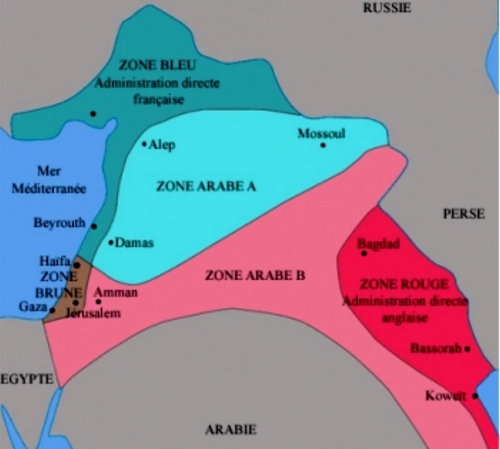
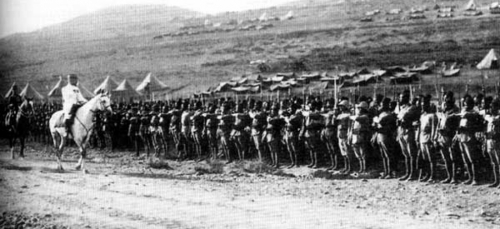
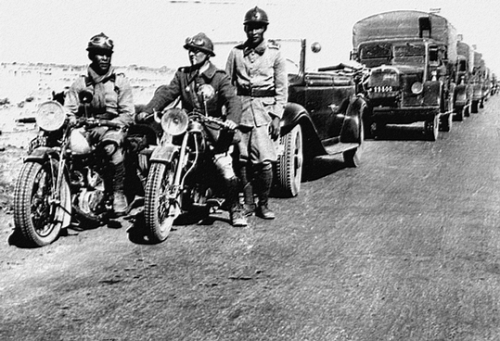
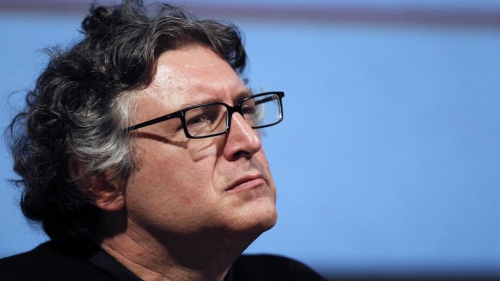

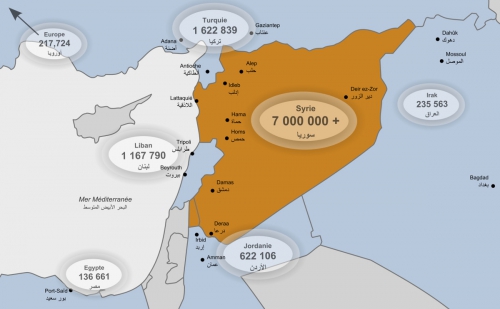
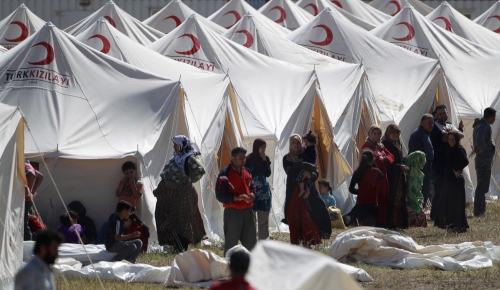
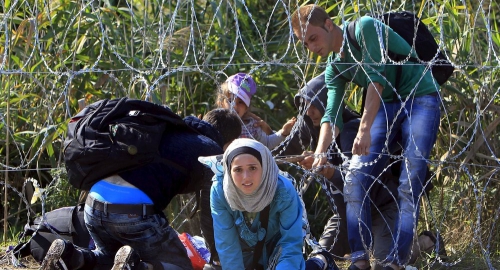
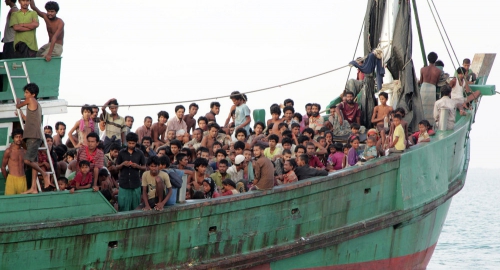




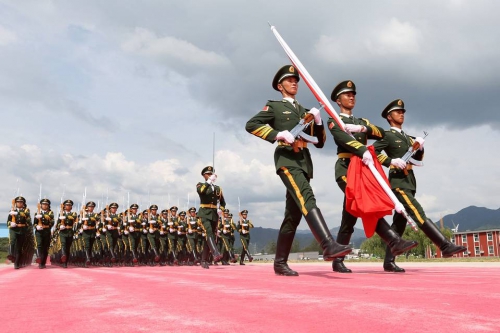
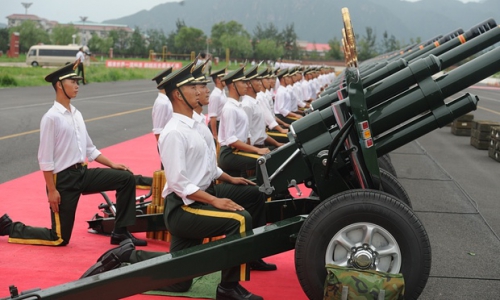
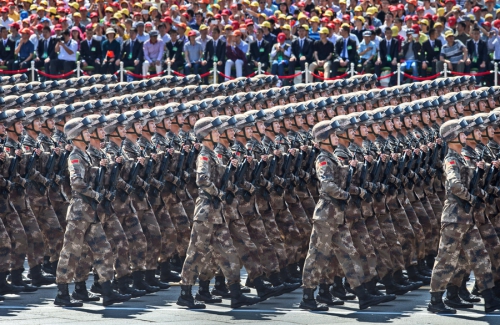
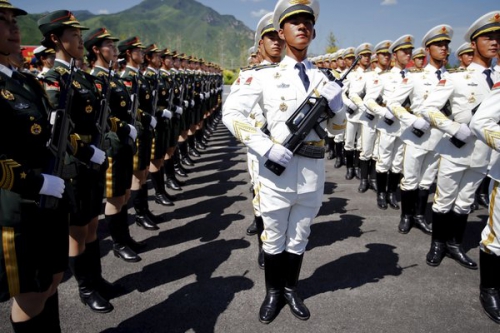
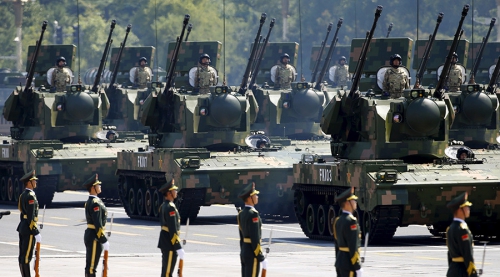

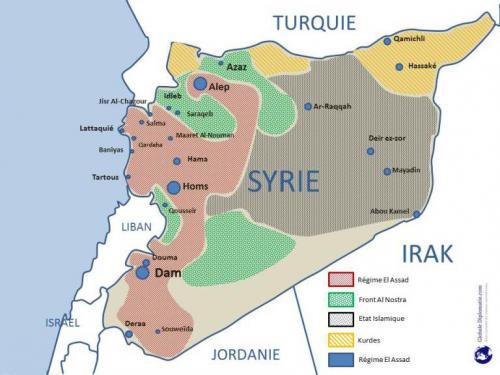
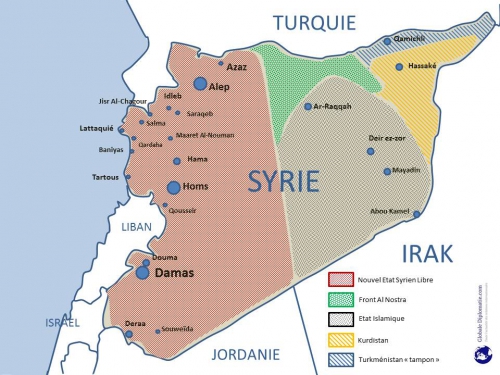
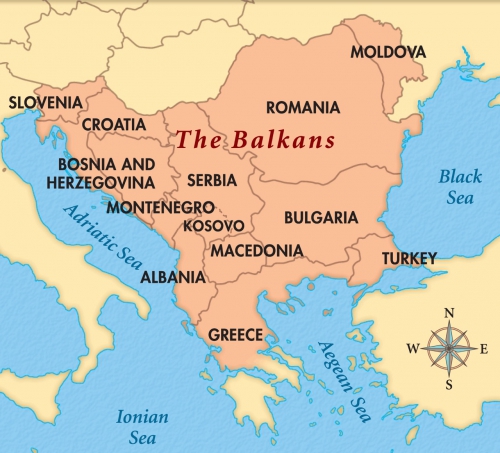
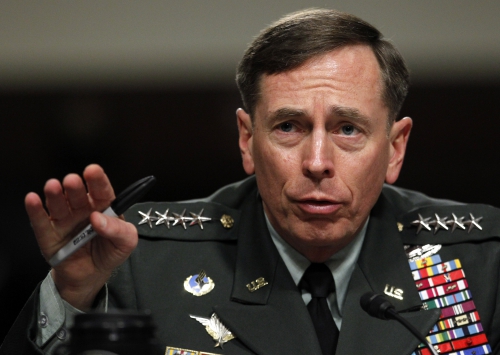
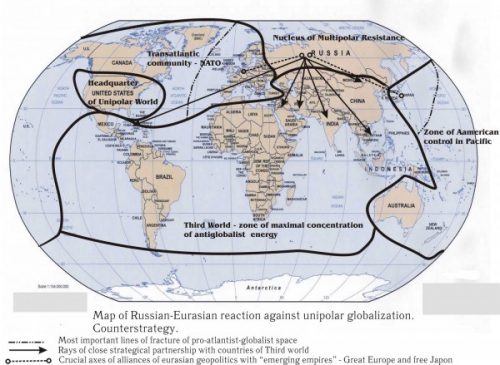
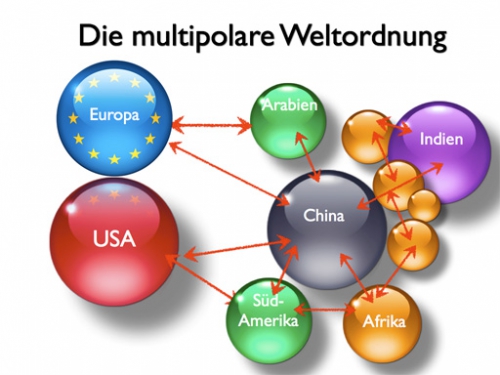
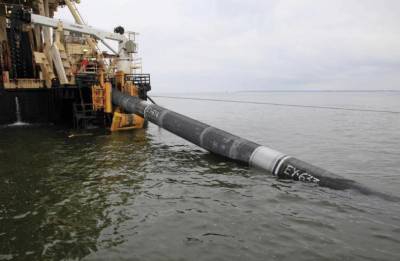
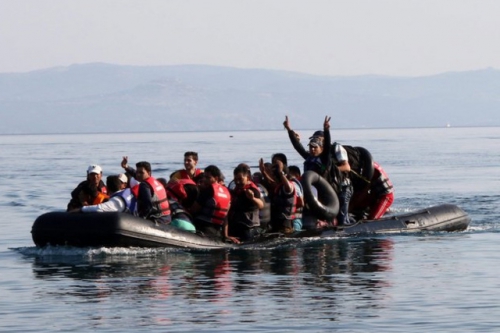








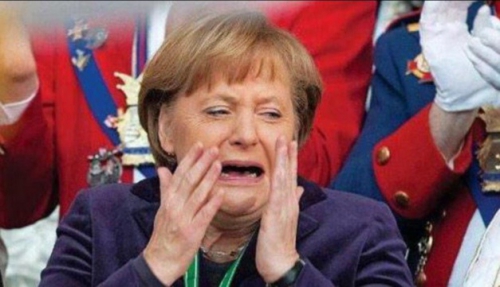
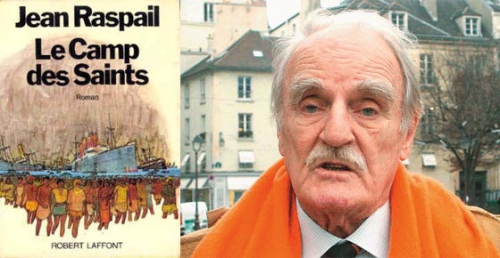
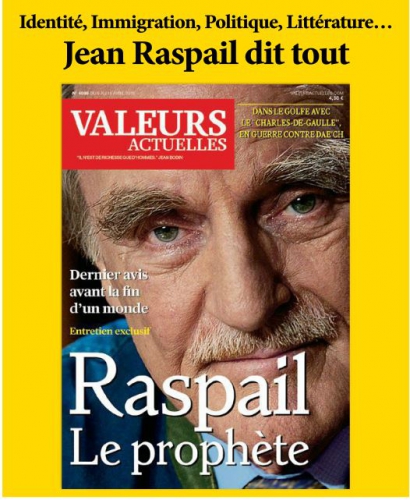
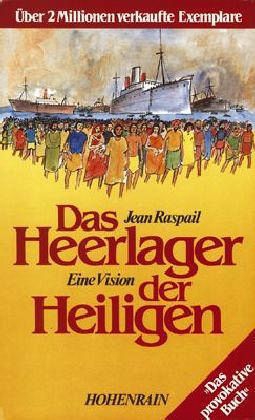 Lichtmesz: Vielen Dank an Herr Ladurner, dass er an diesen wichtigen Roman erinnert hat, der besonders die Leser der ZEIT erfreuen wird, wobei mir scheint, dass er nicht viel nachgedacht hat, als er
Lichtmesz: Vielen Dank an Herr Ladurner, dass er an diesen wichtigen Roman erinnert hat, der besonders die Leser der ZEIT erfreuen wird, wobei mir scheint, dass er nicht viel nachgedacht hat, als er 